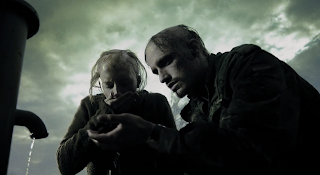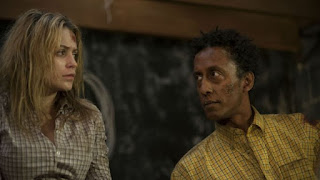It's no secret that I love a good genre film with a mixed generational or just older cast. Give me some Late Phases and The Taking of Deborah Logans and I'm instantly intrigued. Sure, sometimes I crave watching hot young people in bikinis and swim trunks get eaten by alien sand in movies such as, you know, The Sand, but my uneducated estimate would wager that something like 90% of horror films are about hot young people who look good in bikinis and swim trunks.
Boy is it exciting when you land on a new film that decides to focus on an age group so often ignored by the entertainment industry...especially when it's really damn good.
Quick Plot: Henry is a doctor nearing retirement age living in a uniquely designed, fairly secluded multi-storied home with his wife Audrey. The couple seems unremarkably white collar normal until their morning routine takes a turn: breakfast ends early as Henry drags a heavily pregnant young woman inside, tying her to a bed in their carefully soundproofed attic.
Henry and Audrey have no desire to hurt young Becker, you see: they just need her body to do a satanic ritual that will transfer the soul of their late grandchild into the baby she's days away from delivering.
Quick Plot: Henry is a doctor nearing retirement age living in a uniquely designed, fairly secluded multi-storied home with his wife Audrey. The couple seems unremarkably white collar normal until their morning routine takes a turn: breakfast ends early as Henry drags a heavily pregnant young woman inside, tying her to a bed in their carefully soundproofed attic.
I was intrigued going into Anything for Jackson because aside from the fresh character angle, this is a film directed by a filmmaker I know well. This isn't shocking, since in just 7 years, Justin G. Dyck has over 30 directing credits to his name...most of which are made-for-Hallmark-adjacent-channels Christmas romances.
As some of you know, I do an annual podcasting marathon on what I've dubbed Cozy Cardigan Christmas movies.Over the years, I've become fairly fascinated by just how formulaic they are, and how some filmmakers are able to overcome some of the limitations to produce actual good work. I don't know too much about Dyck's career plans, but from what I can see, he's spent the last few years working fast, probably learning a good deal of the craft and how to film on the cheap in Canada.
And honestly, his recent entry, A Puppy for Christmas, is surprisingly delightful.
Screenwriter Keith Cooper has a similar career background, with a robust resume dripping with the kind of cheese I'd drunkenly melt over any late night movie club
Please don't let your (likely) dismissal of the holiday genre influence your decision to watch Anything for Jackson, because by golly, it's quite good. Veteran character actors Sheila McCarthy and Julian Richings (whose face you surely remember being cubed in Cube) are so incredibly sympathetic as grandparents in way over their head, and Cooper's screenplay and Dyck's direction lean into their age with humor without cracking easy jokes. These are genuine, loving people willing to do some very dark things, and their own clumsiness at doing so makes the story something truly heartbreaking and unique. It might even call to mind another wonderful recent horror film about lost children, the grand A Dark Song. That's a very good thing.
Also, it's scary! From an overly aggressive teeth flossing apparition to a sheet-clad trick-or-treating ghost loaded with trauma, Dyck's monsters feel truly fresh in a genre that so often goes for trends.
Screenwriter Keith Cooper has a similar career background, with a robust resume dripping with the kind of cheese I'd drunkenly melt over any late night movie club
Please don't let your (likely) dismissal of the holiday genre influence your decision to watch Anything for Jackson, because by golly, it's quite good. Veteran character actors Sheila McCarthy and Julian Richings (whose face you surely remember being cubed in Cube) are so incredibly sympathetic as grandparents in way over their head, and Cooper's screenplay and Dyck's direction lean into their age with humor without cracking easy jokes. These are genuine, loving people willing to do some very dark things, and their own clumsiness at doing so makes the story something truly heartbreaking and unique. It might even call to mind another wonderful recent horror film about lost children, the grand A Dark Song. That's a very good thing.
High Points
Everything? This movie is grand.
Low Points
There is a bit of a gloomy quality to some of the lighting, which could almost be justified by the wintery Canadian setting, but also, you know, feels a bit muddy
Lessons Learned
No one has more time than a grieving family
If you can't say it, you shouldn't be doing it
Public libraries make suitable settings for satanic rituals
Rent/Bury/Buy
Anything For Jackson is the kind of movie that makes you justify that small monthly Shudder subscription fee, even if you go weeks forgetting you have the channel. It's scary, funny, and most importantly, new. This is what we horror fans dream of finding in new genre entries.The Sand,





















































